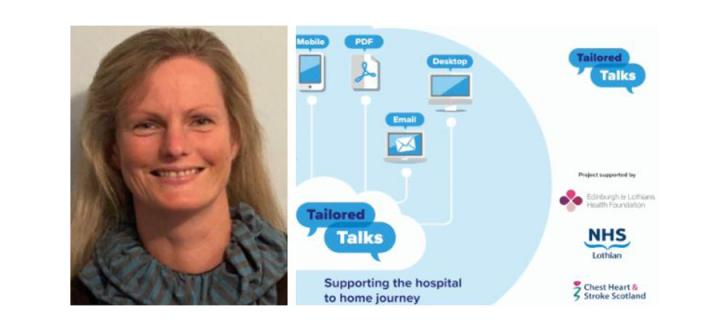Supporting Recovery From Long COVID.
Dr Judith Merriweather, a clinical academic dietitian and Critical Care Recovery Service Lead describes how creative collaborations are supporting patients who are recovering from Long COVID.

People recovering from COVID-19 disease may experience a wide range of physical, psychosocial, and cognitive problems. These symptoms may prevent them from resuming work or physical and caring activities. Persisting symptoms have been called ‘Long COVID’ with estimates that 5-10% of people might experience some symptoms of Long COVID. Supporting recovery is challenging because of limited healthcare access, the numbers of people involved, and the lack of evidence for ‘best practice'.
To create a supportive accessible recovery pathway to eventual self-management for people living with the impact of a COVID 19 diagnosis Chest Heart & Stroke Scotland (CHSS) developed a new service, Hospital to Home(H2H). This service utilises a theoretical model for cognitive behavioural change within the 8 areas of wellness to support patient self-management, specifically for those affected by COVID-19. Concurrently, NHS Lothian (NHSL) have developed a multidisciplinary care pathway to support severe COVID-19 survivors from ICU admission to discharge home. NHSL and CHSS have worked closely to integrate care and support pathways.
As an integral part of this collaboration CHSS and NHSL have also worked with Pogo-Studio (an Edinburgh based digital Start-up company) to develop a digital platform that provides personalized information, support, and advice to COVID-19 survivors and their carers/families. This digital platform called Tailored Talks (TTs) provides personalised information, support and advice to COVID-19 ICU survivors and their families. These bite-sized talks cover a wide range of relevant issues from the time in ICU, through ward-based recovery, to recovering at home. These 500 slides were produced by well over 20 clinicians and specialist from NHS Lothian and CHSS, including ICU doctors, psychiatrists and allied health professionals.
In Practice
The collaboration between the NHS Lothian Critical Care Recovery Service and H2H was launched in January this year. Post ICU COVID-19 survivors at the Royal Infirmary of Edinburgh (RIE) are provided with bespoke and relevant Tailored talks according to their need and stage of journey. At hospital discharge patients are then referred on to the H2H service which provides a series of guided telephone calls focusing on physiological wellbeing, and social support to enable the effective application of TTs. Patients are then invited back to a newly established Critical Care Recovery clinic based at the RIE. This multidisciplinary clinic allows the patient to see the relevant healthcare professionals and affords another opportunity to provide relevant TTs.
The use of TTs has been positively received by COVID-19 ICU survivors and we have used their feedback to improve content, presentation, and accessibility. Patients have reported that they found it helpful to have personalised information at the appropriate stage in their journey and that this was available on their mobile device or computer. Accessibility of the talks is another positive benefit as patients have the opportunity to share their tailored information with family members.
The Future
We want to make this combination of the digital resource of COVID TTs plus the enablement of H2H services available to as many patients with Long COVID as possible across Lothian. Funding from the Edinburgh and Lothians will allow us to create a supportive accessible recovery pathway to eventual self-management for people living with the impact of a COVID 19 diagnosis; to engage with people living with impact of the virus to better understand the spectrum of diagnosis and clinical manifestations and the impact on daily living; and to evaluate the efficacy of our service design, make appropriate improvements and prepare to scale up across the country.

